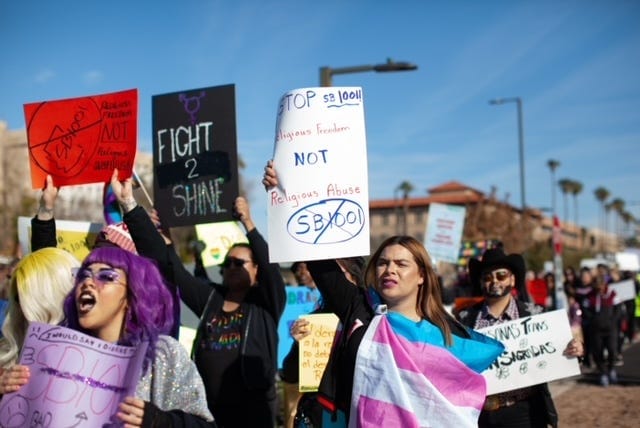Coming soon
This is Dog on the Road, a brand new site by Ryan Singel that's just getting started. Things
The state's religious right has moved forward two of seven anti-LGBTQ+ bills that aim to limit queer people from the public. Protesters this weekend had words to say.

In a show of force against the state’s far-right Republican caucus, drag kings and queens, trans men and women, nonbinary people, and the whole range of queer identities showed up outside the state Capitol yesterday to protest against a myriad of bills aimed to limit—and in some cases completely eliminate—their rights.
The bills—seven, currently—are only a handful of the hundreds that legislators have filed, but they have gathered enough national attention to place Arizona squarely in the center of the nation’s culture wars, particularly on LGBTQ+ rights.
Two senate bills, SB1001 and SB1005, have passed their committees: The first gives religious preference to school staff or contractors to not acknowledge students by their preferred names or pronoun if they hold a sincerely held religious belief, even if parents give permission; The second makes it easier for parents to sue school districts if they disagree with what their children are taught, such as queer issues.
Neither bill is scheduled yet for a full Senate vote.
Students at the protest who could be impacted by the bills said they were horrified.
“It would be really awful to live like that,” said Quinn N., a 15-year-old gender fluid student in Avondale who didn’t want to be fully named. They said all students should be able to express themselves safely in schools without fear of being outed, and said that parents—and legislators—needed to listen more to what’s happening from students, directly.
Kanix Gallo, a 15-year-old student activist who came out as a trans male in middle school, said he already faces pushback at his school in Chandler: “I was met with discrimination for who I am,” he said. “And a couple teachers refused to use my name or pronouns and I had to talk to admin about it. But admin was not always the kindest about said situations.”
Gallo also echoed what other students had said, that legislators who supported hills were failing to listen to students who their bills directly affect. He said they were hypocritically sacrificing their physical and mental safety to score political points, while also claiming the bills were written for their well-being.
For the organizers of the protest on Sunday, they say the bills are Trojan horses, creating hysteria meant to obfuscate from more important issues.
“This is to distract us from things that matter,” said Brianna Westbrook, one of the state’s more galvanizing trans voices who ran for the house this past election, but lost. “Every six months, I hear about more unsheltered community members dying in the streets. Their lives matter.”
Others, like Jeanne Woodbury, the interim executive director of Equality Arizona, spoke plainly:
“Fuck this,” she said. “I am a lobbyist. And my job is to sit down and have reasonable discussions with these people. But there’s no reasonable discussion over my right to be myself, or what surgeries I’ve had, or what hormones I take.”
(Equality Arizona is a content sponsor for LOOKOUT’s weekly newsletter.)
But beyond the bills that address trans students, the march was organized primarily to confront rhetoric created by the nation’s religious right and embraced by state Sens. Anthony Kern and John Kavanagh to try and limit drag queen performances.
The bills proposed by the two senators could relegate drag shows—even Broadway theatre—to performances that would require a license similar to adult clubs. Performers, themselves, would also need to be licensed.
Drag performance, though it can contain sexual imagery as can all art, has long been a parody or commentary on gender. Drag performers have also historically been at the forefront of queer representation in political movements.
The bills, drag performers say, is a direct attack against that historic political and artistic movement.
“We know that the queer community, historically, has less resources than most,” said drag performer Daddy Satan, who organized Sunday’s protest. “I fear for what would happen to those people. But I also fear what happens when we limit this kind of art form.”
Kavanagh and Kern both have (mistakenly) described drag as hyper-sexualized. And their bills are written so broadly that they could also do away with drag queens or performers who dress in drag at events such as the annual Pride marches and Phoenix’s Rainbows festival.
Erica Connell, a drag performer who goes by name The Weird Violet, said that the legislature is not just playing games with their livelihood, but also with their existence.
“They are playing really disgusting politics,” she said. “And they are not going to stop.”